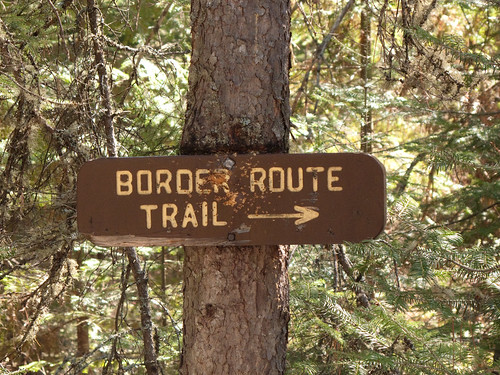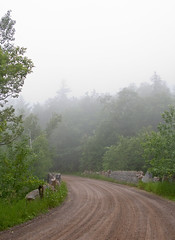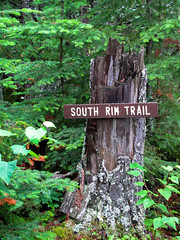
The sermon for the coming Sunday June 20, 2010 has moved from random thought to a stream of consciousness.
Mulling over the lessons for 6/20:
A bit different riff on 1 Kings 19 and Gospel Luke 8:26-39:
Retell the story of 1 Kings 17 - the "Sacrifice Duel" Elijah sets up with Baal's prophets. Retell this story well and you'll get the attention of the most jaded in the congregation. It ends, of course, with Elijah winning. With that particular ability to control the crowd that victors possess, Elijah orders the slaughter of the 450 prophets - out of 'zeal for the Lord'. Jezebel of the Baal faction responds, in kind, telling Elijah she's put out a contract on his life. At first Elijah seems surprised (that the Lord would let such a thing happen to him), Duh, and the flees in fear.
He arrives at the Lord's mountain where the Lord gives him a bit of a lesson. The Lord is NOT in the violent displays, but in the quiet and reflective. Its as if the Lord says, (Duh) Elijah, you didn't quite get it right. Go back and try again! You need a better 'working definition' of the Lord and the Lord's power.
---
In the Gospel we see a man shackled and bound (a bit of violence there) because of his being tossed about violently by demons (outer or inner). The towns folk can only respond with a bit more of violence - shackling him. Some key words echo here - the violence/troubles of Elijah and his fear so he must go away. Also fear of the towns folk (perhaps they worried that 100 pigs might be 'charged' for each healing) but I suspect they feared more of their own inner or social demons might be disturbed by Jesus). What a change that would demand! The possessed man - and his QUIET (the man sitting quietly at Jesus' feet) and because of FEAR (the towns folk) it is Jesus who must and does go away. Do we have too many troubles/too much on our plates hence too many fears, and too little quiet?
Or consider the fortune cookie advice I received this week: "Don't find fault, find a remedy"... quietly.
Wednesday, June 16, 2010
"Don't find fault, find a remedy"... quietly.
Posted by kgj at 2:14 PM 0 comments
Thursday, April 08, 2010
St. Louis River Trail
Out for exercise? Then why drive to the Munger Trail in Carlton. Get off I35 in Cloquet and start your ride immediately. Take exit 349 at Scanlon. There you will find the beautiful new bike trail into Carlton. The Saint Louis River was completed late last Fall.
Louis River was completed late last Fall.
The Scanlon Park and Ride provides ample parking. The old Northern Pacific right-of-way makes a beautiful corridor to the Munger Trail access in Carlton. The trail has a remote feeling most of the way. In Carlton it safely guides you to the Munger Trail Access
From the 'Northern Pacific Junction' you can cycle north into Duluth or south to Barnum. You can also access the Alex Leveaux trail through Wrenshall and beyond.
Enjoy the Saint Louis River Trail.
The trail parallels the Saint Louis River which you never see during the Carlton to I 35 Segment! When the trail is extended to Scanlon, you will enjoy some fantastic views of the River. Phase two of construction will extend the Saint Louis River Trail into Scanlon.
The St. Louis River Trail follows a railroad spur built by the St. Paul & Duluth Railroad in 1878
The Northern Pacific Railroad started building westward from Carlton (then ca lled Northern Pacific Junction) on February 15, 1870 the same year the Lake Superior & Mississippi Railroad completed the link from St. Paul to Duluth on August 1, 1870.
lled Northern Pacific Junction) on February 15, 1870 the same year the Lake Superior & Mississippi Railroad completed the link from St. Paul to Duluth on August 1, 1870.
The St. Paul & Duluth constructed the Knife Falls branch in 1879 north from the North Pacific Junction (later renamed Carlton) rail crossroads into Knife Falls (later named Cloquet) to service a new sawmill built in 1878.
Obstacles in the river south of Knife Falls prevented the easy log driving south of this point into Duluth.
With rail transportation established, the local lumber industry boomed.
In 1888, the Duluth & Winnipeg RR began building northwestward from Knife Falls / Cloquet along the St. Louis River. Traffic from this new line was routed into Duluth over this St. Paul & Duluth spur.
Later the Duluth & Winnipeg built tracks eastward out of Cloquet through Esko and into Duluth via the Becks Road corridor. This project left the railroad short of cash and open to takeover by James J. Hill.
Finally, in 1898, Mr. Hill and the Duluth & Winnipeg built a line parallel to this road bed out of Cloquet slightly to the West into Northern Pacific Junction/Carlton, through Wrenshall looping eventually into Superior Wisconsin. The Burlington, Northern & Santa Fe continue to use that trackage.
On June 15, 1900, the Norther n Pacific Railroad purchased the St. Paul & Duluth Rail which originally build this spur into Cloquet.
n Pacific Railroad purchased the St. Paul & Duluth Rail which originally build this spur into Cloquet.
In addition to the St. Louis River, two logging railroads fed pine to the many lumber mills in Cloquet.
The Minnesota & North Wisconsin built west out of Scanlon beginning in 1899 as the Mitchel & McClure passing near Adolph, Wild Rice Lake, north of Duluth, to Alden Lake, Northwest of Knife River.
In 1904 low water levels in the St. Louis River during spring log drives spurred building of the Duluth & Northeastern Railroad out of Cloquet to Island Lake and later to Rush Lake, Harris Junction and Hornby, north of Two Harbors. The Saint Louis River and two logging railroads brought pine into Cloquet. The Northern Pacific Railroad, over this railroad grade, together with the Great Northern a few blocks to the west, hauled the lumber to market.
Posted by kgj at 1:01 PM 0 comments
Labels: bicycle, Border Route Trail, Carlton, Cloquet, Knife Falls, Lake Superior and Mississippi, Munger Trail, Northern Pacif Junction, Scanlon, St. Louis River Trail, St. Paul and Duluth
Saturday, March 13, 2010
A Way in the Wilderness
I have a wealth of material: Mary who anoints Jesus feet. John identifies hers as the sister of Lazarus whom Jesus has returned to his sisters from the dead. I can imagine the immense gratefulness in Mary’s heart.
Luke relates a similar story a woman anointing Jesus feet that he designates as a “woman of ill repute.” The other gospels tell of women anointing Jesus, but his head.
Of course, down though the ages much confusion reigns: Same woman? Different event? A respectable Friend of the Family? A woman of disgrace?
The disgraced woman spin from centuries with Old Men in charge? Might it be a different spin with Old Women retelling the story?
Anyhow who cares! Because of this ambiguity she is a story tellers delight. I will recast the story in a way which forces the listener to question their own judgment about this woman.
My reading during this portion of Lent is the biography of John Newton: slaver, captain of slave ships in the infamous Middle Passage, repentant, Evangelical Anglican preacher, spiritual guide to William Wilberforce who for twenty-six years led the fight in Parliament to abolish the slave trade. Wilberforce succeeded in 1803. John Newton advised Wilberforce to remain a politician in Parliament rather than study for the ministry, convincing him he would be more valuable to the cause of slavery’s abolition as a politician. In 1833, three days before Wilberforce died, Parliament passed the Slavery Abolition Act which abolished slavery in most of the British Empire. Some three decades before the United States!
I impishly delight in the juxtaposition: whore – politician whom we both praise for the great good they bring. I won't go there in the homily, however!
The collect prayer leads further: “God, you alone can bring can bring order to the unruly will and affections of sinners”
It seems to me that we often diminish the outrageous generous behavior of God who deals to so open-handedly with the Mary’s and John Newton's and pulls great good from the jaws of evil. We often say the sinner repented and God embraced them – but seems to me God embraces and then helps the person sort out the evil and good in a their life and most importantly how to respond. Then repentance become possible.
And the Hebrew Scriptures from Isaiah add a wealth of images: “Make a way in the sea, a path in the waters”; “do not remember former things, or consider the things of old.”, “Make river in the desert”, “give water in the wilderness” --- all descriptions of the results of a Mary or a John Newton.
Some of us clutch fast to our evils. Some we’ve done, some we only imagine we’ve done. Afraid to lay the mess into Another’s hands who can help us “bring order to our unruly wills and affections” Others have the eyes of our hearts so closed in denial to the major or petty evils of our lives because we dare not hope God can bring good from acknowledged evil.
Posted by kgj at 9:04 PM 0 comments
Labels: anointing, Fifth Sunday of Lent, John 12:1-8, John Newton, Lent
Tuesday, March 02, 2010
Northeastern Minnesota Trails

Soon some of Minnesota's most beautiful hiking trails will join the North Country National Scenic Trail. This trail runs more than 4,600 miles from Crown Point in eastern New York to Lake Sakakawea in western North Dakota.
If legislation passes congress to reroute the trail, the Superior Hiking Trail, the Border Route Trail and the Kekekabic Trail all legendary will be incorporated into North Country National Scenic Trail.
The NCNST, longest of the 11 National Scenic Trails authorized by congress passes through seven staints. The National Park Service administers the trail but primarily volunteers maintain the trail.
administers the trail but primarily volunteers maintain the trail.
I'm not of an age when I am likely to hike the entire 4600 miles, but I have hike portions of the Minnesota Arrowhead trails singled out for inclusion.
Inclusion would be a wonderful reward for the many volunteers who have planned, built and maintained these trails.
Posted by kgj at 4:22 PM 0 comments
Labels: Border Route Trail, BWCAW, Kekekabic, Scenic Trail, Superior Hiking Trail, wilderness Northwoods
Sunday, February 21, 2010
To Dust We Shall Return
I was my time in the rotation to preach at St. Andrew's Episcopal Church in Cloquet this morning
A bit of graffiti under the Highway 33 Bridge sparked my meditation for Lent this year. Above and beneath the graphics the artist wrote: "Make a name; life is short!"
Someone young, I suspect, produced this piece of art. I doubt any of us older folk, sitting here this morning, go around town with a can of black spray paint doing art under bridges.
You can see this street art. You will find it on the way to the bar at the old Northeastern Hotel for a glass of beer or wine. By the way it's said the bar at the Northeastern has the longest bar in Northeastern Minnesota made  of one solid piece of wood. Of course, I cannot verify that since I have not visited all of the bars in Northeastern Minnesota. Yet! Also I believe the establishment a bit more positive cache than it once possessed.
of one solid piece of wood. Of course, I cannot verify that since I have not visited all of the bars in Northeastern Minnesota. Yet! Also I believe the establishment a bit more positive cache than it once possessed.
"Make a name; life is short."
Lent speaks to this advice given in black spray paint.
A phrase from the Old Testament book of Genesis echoes over the beginning of Lent:
Sometimes the King James version seems to give these admonitions more heft:
Till you return to the ground,
For out of it you were taken;
For dust you are,
And to dust you shall return."
As the church imposes ashes on us at the beginning of Lent, we hear these words proclaimed to us: "You are dust and dust you shall return".
The natural question in every human heart: How do we rise above this dust?
"Make a name; life is short."
Rather than this message, Lent and Jesus would suggest something else.
"Make a friend life is short."
"For dust you are,
And to dust you shall return."
We hear this phrase of Genesis just after Adam and Eve have messed up. However, in the spirit of Jesus, I suggest this phrase is more than a condemnation of misdeeds or a warning against sin. We must always read Scripture in the spirit of Jesus: Heal the sick, feed the hungry, comfort the afflicted, visit the imprisoned, give drink to the thirsty and shelter the homeless.
"Make a name; life is short."
Rather Jesus would say: do good while you can, life is short. Our genes, I suspect, drive us look after ourselves and those who would cover our backs. However, the spirit of Jesus calls us look after others. Science tells us evolution programs a bit of altruism into to us to assure our survival. But the generosity to which Jesus calls us requires, as Genesis suggests, the "sweat of your face".
Just as we hear of Jesus in the Gospel lesson this morning, we must withdraw from the noise of our days and the anxiety of our lives and sit for a time in quiet and reflection. Goodness takes work, needs strength, demands courage, requires character. The call of Jesus does not automatically grace us with courage and character.
We can throw seed on ground and some will grow. But to feed our families and our poor neighbors we must till the soil to prepare it. We must pull the weeks, fend off insects, outfox the rabbits, water when dry, and carefully preserved the harvest for winter. Growth may be automatic; harvest requires sweat.
"Make a name; life is short."
Life is short! Fate limits our time for doing good, for comforting the weary, for feeding the hungry, for sheltering the homeless, for healing the sick, for reconciling the estranged, for visiting the isolated, for making peace.
"Make a name; life is short."
Perhaps someone young painted this phrase but what might this young person's parents have painted? Make a killing; life is short. Make money; life is short. Make a fortune; life is short. Guard your own; life is short. Or as bumper stickers once proclaimed: "He who dies with the most toys wins."
We do reach a point where we have enough. But amazingly we find it difficult to give away some of the rest. So from time to time we must review our character and strength so we can practice goodness. In this season of Lent, review your strength for doing good.
The gospel teaches Jesus went to the desert to wrestle with the temptation of greed and selfish. Yes, even Jesus battled acquisitiveness and the lust for power.
Build the pile; life is short.
The news, our radios, our television, our newspapers and magazines, have given us many examples of greed and the problems it causes. Our leaders seek to regulate our lust to accumulate with laws and regulations. Laws may lessen greed but law cannot assure generosity. Character and principle enable generosity. We must cultivate our character and nourish our principles. Do that this Lent!
Paul, a learned lawyer, knew laws can only make men and women honest; it cannot make them generous, kind, compassionate, in short good! Regulations can only control greed; they cannot force generosity.
St. Paul teaches us of this difference. He presents the image in his letters of a child who has not yet developed his character or strengthened the principles which will keep him from evil, from greed. During the time of his youth, a child is protected by parents, by guardians, by teachers. He is controlled by the law. When mature strength of character and the power principle develop, he is no longer under the law. He walks Jesus. This walking with Jesus, Paul calls Faith.
This Lent, renew and deepen your faith.
2 He is subject to guardians and trustees until the time by his father.
3 So also, when we were children, we were in slavery under the basic principles of the world.
4 But when the time had fully come, God sent his Son, born of a woman, born under law,
5 to redeem those under law, that we might receive the full rights of sons.
6 Because you are sons, God sent the Spirit of his Son into our hearts, the Spirit who calls out, "Abba, Father."
7 So you are no longer a slave, but a son; and since you are a son, God has made you also an heir.
We are heirs of God when we do the goodness of God. We are children of God when we display the compassion of God. We are daughters of God when we delight in feeding the hungry, healing the sick and comforting the afflicted. We are sons of God when we promote peace, give water to the thirsty, open doors to the blessings of our society for those we once shut out.
"Make a name; life is short."
"Do good; life is short."
Expressed more plainly, we rise above the dust not by building piles money or mounds of things, not by building piles but by bringing smiles to others.
"Remember that you are dust and to dust you shall return." The words call us not just to avoid evil but to turn toward good.
"Make a name; life short!"
Lent suggests requests and enables us to rewrite the graffiti under the bridge on our hearts: "do good; life is short!"
Posted by kgj at 7:02 PM 0 comments
Labels: Cloquet, Gal 4:1-7, Gen 3:19, Lent, sermon, St. Andrews
Saturday, February 20, 2010
On My Birthday
Each year as February 22 slips by and another of my birthdays, I whisper words of gratitude that my folks avoided naming me after George (or after Owen - my Grandfather).
I could live with the name of my other grandfather: Kasimir -> Charles -> Chuck.
Mr Washington would be 278 years old today. My age doesn't yet approach 3 digits. The most I gleaned from my parents about the origin of mya name, Kenneth, was, "a friend". Does that mean a friend named Ken or a friend suggested Ken? Oh yes, the name was voguish in '43. Or maybe the News Reels told of a war hero named Kenneth?
The most I gleaned from my parents about the origin of mya name, Kenneth, was, "a friend". Does that mean a friend named Ken or a friend suggested Ken? Oh yes, the name was voguish in '43. Or maybe the News Reels told of a war hero named Kenneth?
Well this Gaelic - Scottish - derived name means 'handsome' or 'born of fire' according to the experts.
Born of Fire: an early photo shows me in the arms of my sailor father, who is going off to war. Fits.
Handsome:
My folks got that correct!!
Alas, apart from the Ken of Ken & Barbie fame, I can't think of any 'Ken' Celebrities!
Posted by kgj at 7:19 PM 0 comments
Monday, February 15, 2010
Bugs in the Woods
We spoke of wood ticks and deer fly. The ticks can be awful in the spring and June. The deer fly can make late June and July awful.
Deer fly tend to buzz about your head and bite your limbs inside the canoe. One of these gentlemen suggested: Place a band of fly strip around your head sticky side out. The flies which tend to bump into your head will hit the flypaper. The sticky goo will take them out of action.
The other gentleman said wood ticks climb upward as far they can get. Therefore you tend to find them stuck in armpits, your groin, your waist if you wear a tight belt or your hair. He recommended wearing Duct Tape. Place a piece of tape around your collar sticky side out. Make sure your clothes are tucked in well then you will conquer of the ticks.
Here we have two non-chemical ways to control North-wood bugs.
I've not tried them so you will have to take their word for it.
They offered no solution for black flies and knats!
Posted by kgj at 7:55 PM 0 comments
Labels: BWCAW, deer fly, Minnesota, Northwoods, tick, wood tick, woods
Tuesday, February 09, 2010
Kowsit Lats
 I visited my brew master brother in Houghton Michigan this past weekend. I love a beer he formulated during the recent hops shortage: Kowsit Lats.
I visited my brew master brother in Houghton Michigan this past weekend. I love a beer he formulated during the recent hops shortage: Kowsit Lats.
Locals say copper miners grazed cows along this road. Time & local accent renamed it to: Kowsit Lats!
Guess the original name!
You can taste this wonderful beer at the Library Brewpub in Houghton.
Find help here!
Posted by kgj at 6:01 PM 0 comments
Labels: beer, Kowsit Lats



